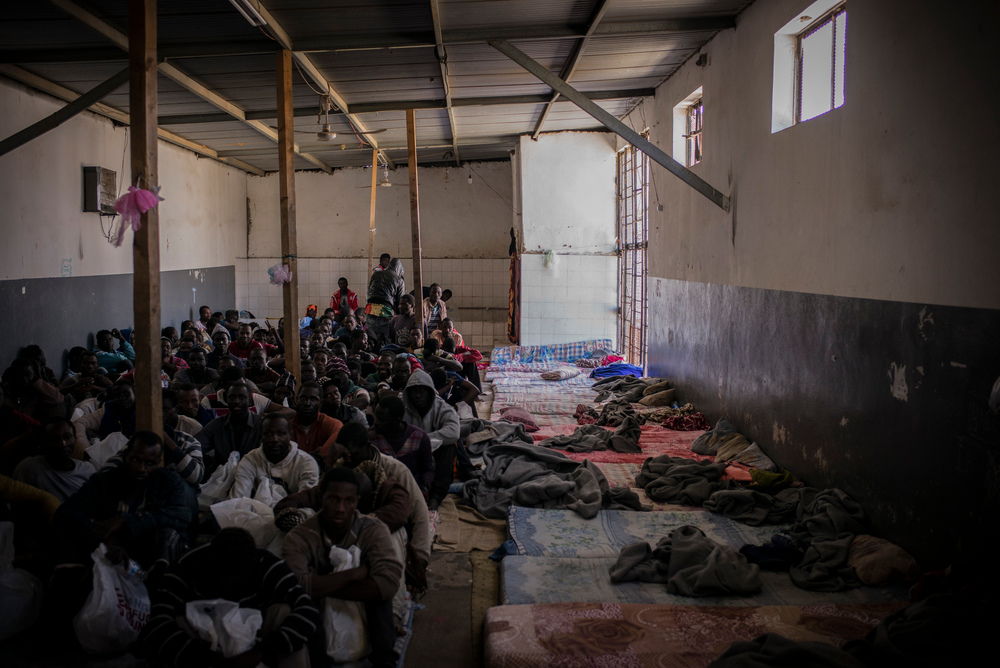LIBYA: MSF resumes activities in Tripoli detention centres following assurances from Libyan authorities
Almost three months after suspending medical activities in two detention centres in Tripoli following a series of concerning incidents, Médecins Sans Frontières/Doctors Without Borders (MSF) has returned to work in these centres, to provide vital medical care for detained migrants and refugees. MSF has also resumed activities in a third detention centre, which it had lost access to during that same period.
This development comes after recent talks between MSF and Libya’s DCIM (Directorate for Combating Illegal Migration) in which MSF received assurances that certain basic conditions would be met in the detention centres, enabling us to resume our activities in line with medical ethics and humanitarian principles. These conditions include: preventing the use of violence against detained people and ensuring the safety of MSF teams; allowing our medical staff unhindered and sustained access to the detention centres; allowing detained people unfettered access to our medical services; and ensuring full respect for the medical confidentiality of people held in the detention centres.
On the 15th of September, MSF teams restarted mobile clinic visits to Al-Mabani (Ghout al-Sha’al), Abu Salim and Shara Zawiya detention centres in Tripoli. Our teams were able to provide much-needed medical care, including psychosocial support, to men, women and children kept in these facilities, who otherwise would have very minimal access to healthcare.
In this first week, MSF doctors examined and treated 404 patients, including 30 children under the age of 15, mainly suffering from skin diseases, gastrointestinal disorders, and upper respiratory tract infections – conditions that are attributable to the poor conditions in which they are held. Our medical team also facilitated the emergency referral of 28 patients to receive urgent medical care in MSF-supported clinics.
While MSF welcomes the assurances made by Libyan authorities that they would address the concerns which compelled us to suspend our activities last June, enabling us once again to provide essential medical care to detained people, we continue to strongly call for an end to this system of arbitrary and indefinite detention in Libya.
Detention centres have desperate conditions inside. Most detention centres lack ventilation and natural light; some are so overcrowded that up to four people share one square metre of space – forcing people to take shifts to lie down and sleep. People lack consistent access to clean water and hygiene facilities.
Additionally, migrants and refugees receive insufficient food to eat, with just one or two small meals a day, usually a small piece of bread with cheese or a plate of macaroni to share amongst many. The lack of enough nutritious food has resulted in some women being unable to produce breastmilk to feed their babies.
MSF reiterates calls for the closure of these detention centres, for the release of all the people detained in them, and for adequate humanitarian assistance and protection services to be provided to them upon release, including urgent voluntary repatriation and resettlement out of Libya.
ENDS
Note to Editor:
MSF has been working in detention centres in Libya since 2016, providing people with basic healthcare and psychosocial support. MSF teams also identify vulnerable people and refer patients requiring specialist care to hospitals across Libya.
Between January and August 2021, MSF teams working in detention centres in Tripoli provided medical treatment to more than 10,000 patients, carried out 10,910 medical consultations, and facilitated the referral of 439 patients for specialist care to hospitals and clinics across Tripoli.
In Zuwara, a new MSF programme provides medical, psychosocial and protection services to refugee and migrant communities. In Bani Walid, MSF teams provide general healthcare and medical referrals to refugees and migrants who have escaped captivity and to victims of torture and trafficking.
MSF also provides technical and hands-on support to Libya’s National Tuberculosis Programme (NTP), run by the National Centre for Disease Control (NCDC), to diagnose and treat Libyans and non-Libyans with TB. MSF also runs a TB programme in Misrata.


